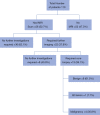Magnetic resonance imaging for invasive lobular carcinoma: is it worth it?
- PMID: 31328102
- PMCID: PMC6606482
- DOI: 10.21037/gs.2018.10.04
Magnetic resonance imaging for invasive lobular carcinoma: is it worth it?
Abstract
Background: Invasive lobular cancer (ILC) of the breast can provide diagnostic and therapeutic challenges due to its often mammographically occult and multifocal nature. UK guidelines recommend magnetic resonance imaging (MRI) when considering breast conserving surgery (BCS) in women with a diagnosis of ILC. A small number of studies have shown that due to its low specificity, MRI can lead to additional invasive investigations whilst rarely identifying additional tumour foci that affect management. We carried out a retrospective study of patients diagnosed with ILC to assess the impact of MRI on management and to evaluate if breast density on mammography could indicate likelihood of additional disease being found on MRI.
Methods: A retrospective analysis of the electronic patient records for all cases of ILC diagnosed between January 2013 and December 2016 was carried out.
Results: A total of 110 cases of ILC were identified of which 69 women were considered for BCS and 58 (84.1%) women underwent MRI. A further abnormality was seen in 22 (37.9%) patients of whom 13 (59.1%) had a further core biopsy with 4 cases being positive for malignancy. Overall MRI changed the surgical plan from BCS to mastectomy in 7 (10.1%). Breast density did not predict the presence of additional findings on MRI.
Conclusions: MRI assessment of ILC rarely affects the management when BCS is considered. Having radiologically denser breasts did not correlate with increased reoperation rate. Larger prospective studies may provide further guidance on MRI specificity and breast density.
Keywords: Invasive lobular carcinoma (ILC); breast cancer; magnetic resonance imaging (MRI).
Conflict of interest statement
Conflicts of Interest: The authors have no conflicts of interest to declare.
Figures
References
-
- Dixon JM, Barber M. Breast Surgery, 6th Edition, A Companion to Specialist Surgical Practice. 2018.
LinkOut - more resources
Full Text Sources

